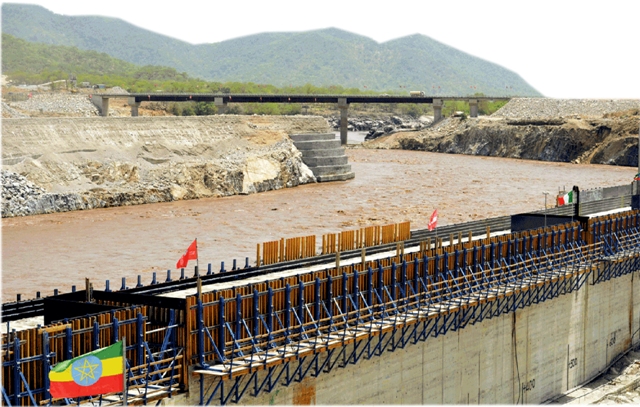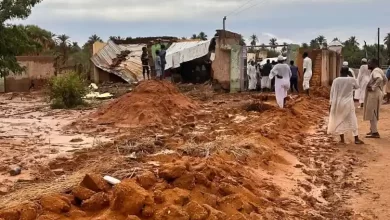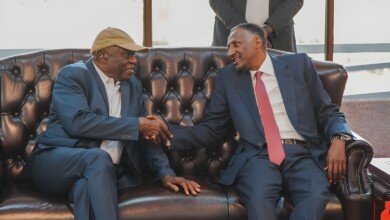Ethiopia summons Sudanese Ambassador in protest over Foreign Minister’s remarks

The Ethiopian Foreign Ministry Spokesperson, Nebiat Getachew Assegid, described relations with the Republic of Sudan as advanced and strategic, adding that it won’t be affected by what is published on social media.
The Ethiopian Foreign Ministry summoned the Sudanese Ambassador, Al-Zain Ibrahim, and informed him of its rejection of the Sudanese Foreign Minister’s statements regarding the threat of war if an agreement isn’t reached between the three countries regarding the issue of Nile waters.
The acting Sudanese Foreign Minister, Ali Youssef, stated in a television program on an Egyptian channel a few days ago that Sudan will stand by Egypt if the dialogue on the Ethiopian Renaissance Dam fails, and that war will remain an option if an agreement can’t be reached to guarantee the rights of the three countries in the Nile waters.
The Ethiopian Foreign Ministry informed the Sudanese Ambassador, last Wednesday, of its dissatisfaction with the Minister’s statements, while affirming its keenness on maintaining relations with Sudan, according to what was reported by the (Sudan Tribune) website.
Diplomatic sources told (Sudan Tribune) that the acting Sudanese Foreign Minister Ali Youssef will visit Addis Ababa soon, and hinted that the visit may be to apologize for these statements.
However, diplomatic sources also shared that Ambassador Al-Zain has yet to complete his accreditation ceremony by presenting his credentials to the President.
The official Spokesperson for the Ethiopian Ministry of Foreign Affairs, Nebiat Getachew, in a statement made on Thursday, described relations with the Republic of Sudan as advanced and strategic, adding that it won’t be affected by what is published on social media.
Nebiat Getachew stressed Addis Ababa’s keenness to develop these relations, stating that the channels of communication between the two countries are open as they maintain permanent lines of communication. He stated that the two countries don’t make a habit of discussing important and sensitive issues through the media, stressing they’re in agreement in regards to “This dam won’t cause harm to Sudan or others, as practical experience over the past thirteen years has proven that Sudan wasn’t harmed by the construction of this dam during the years of filling.”
The Spokesperson for the Ethiopian Foreign Ministry stressed that the Renaissance Dam project is a “Regional economic integration” that his country is working to serve for the benefit of both Ethiopian and Sudanese nations.
He explained that Ethiopia rejects foreign interference in the Sudanese crisis, stressing the ability of the Sudanese to overcome their current ordeal and return stronger than ever before.
The Implementation
In the same context, Nebiat Getachew, confirmed that the Nile Basin Agreement has already entered into force after South Sudan approved it, and pointed to the possibility of implementing major development projects by donors after the legal reasons related to the quorum of the basin countries have been resolved.
Nabiat stated that Ethiopia continues to provide support to Somalia, stressing that his country will continue on the same path to maintain the stability and security of Somalia, reiterating that Ethiopia will continue to confront the attempts of Al-Shabaab Movement to destabilize Somali and regional security, adding that Somalia’s stability is considered stability for the entire region.
Since April 15th, 2023, Sudan has witnessed an escalation in the armed conflict between the Army and the Rapid Support Forces, which began in the capital, Khartoum, and quickly spread to large areas of the states of Darfur, Kordofan, Al-Jazeera, and Sennar.
This conflict has caused huge human and material losses, as thousands of civilians have been killed, and millions of people have been forced to flee, either internally or to neighboring countries, such as Egypt, Chad, South Sudan, and Ethiopia.
This conflict has also led to a widespread collapse of infrastructure, especially in the health and education sectors, as well as a severe shortage of basic services, such as electricity and water.
In addition, Sudan is suffering from severe humanitarian crises, as displaced persons and refugees face harsh conditions in displacement areas, in light of the lack of humanitarian aid and the inability to reach those affected by the ongoing war.





